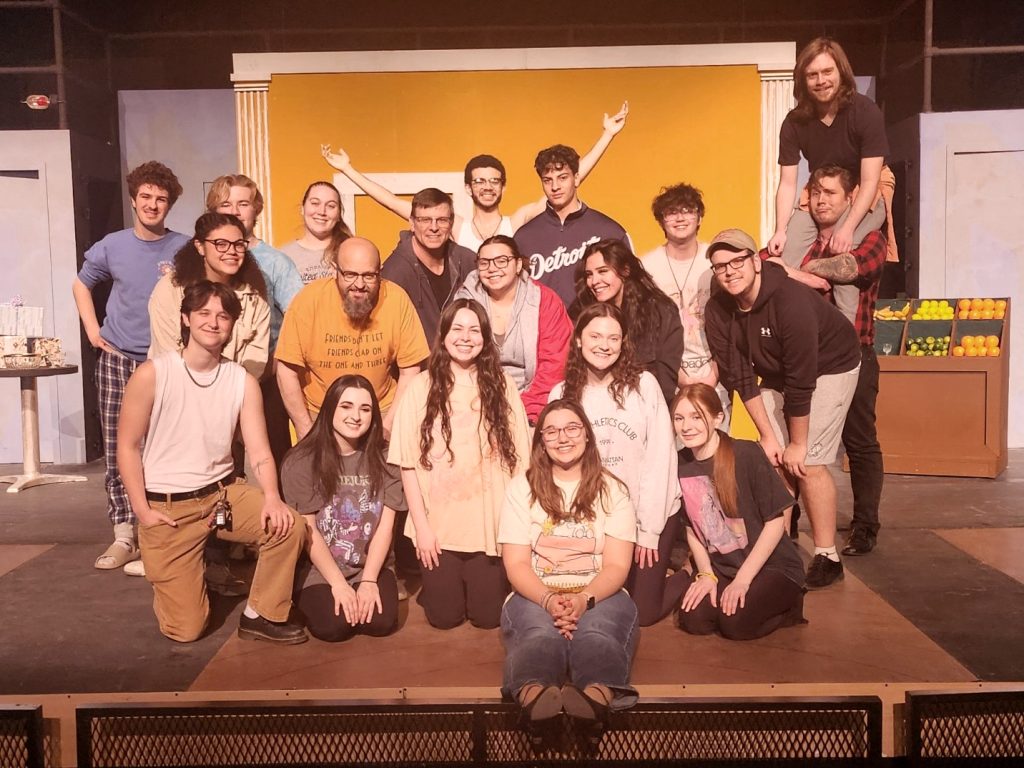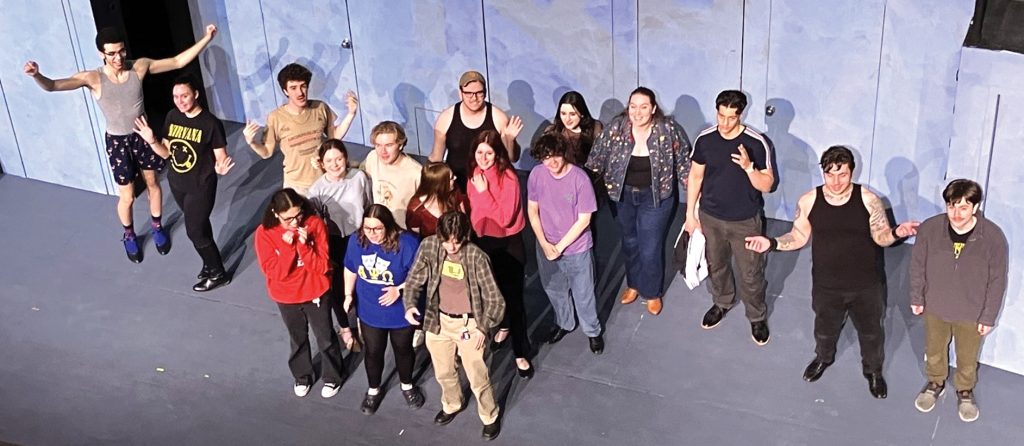
On Stage: Performing Arts at our Oneonta Campuses by Rachel Frick Cardelle
‘Cabaret’ from the Crew POV
“Cabaret,” directed by Drew Kahl, with music by John Kander and Fred Ebb and book by Joe Masteroff, is the spring musical coming to SUNY Oneonta the last full week of April. The show is a stage musical that premiered in 1966, which came from the 1951 play, “I Am a Camera,” that was based on Christopher Isherwood’s book “Goodbye to Berlin.” All these works, as well as the 1972 film version of “Cabaret,” directed by Bob Fosse and starring Liza Minelli and Michael York, are set in Berlin in the years leading up to Hitler’s election.
The cast of “Cabaret” were exciting and fun to watch in rehearsal. Even as one sits in the audience, knowing the dark cloud of fascism that hangs over the fun and decadence happening on stage, even as the characters on stage begin to feel the first rain drops from that cloud, the singing, dancing, and gaiety continues. I had many questions for the cast about the roles they played, and the dancing and singing they needed to learn, but for this production I decided to interview the crew. As I watched them bustling about, silently looking on during the vocal warm-ups and director’s notes from the previous rehearsal, stepping in to cover for an absent cast member, I thought it might be interesting to see this production from the crew members’ eyes.
Then I heard the stage manager, Katelyn (Litwak), say to the director, Drew (Kahl), “It’s just Act II tonight, so we’ll need a gorilla. I’ll go do rock-paper-scissors with Sophia and Tatum.” Yup. Definitely wanted to get the crew’s perspective this time.
After rehearsal, I sat with Drew, Katelyn, Tim Iversen (music director), Sophia Milton (assistant stage manager), and Tatum Sasser (assistant stage manager). Not surprisingly, the two directors spoke to the bigger picture of the production and how they have thought through the acting and musical numbers.
Tim, who teaches at Cooperstown Central School, talked about how useful his involvement with SUNY O’s musical productions over many years has been to his teaching. Working as music director at the college level has allowed him to bring a more professional environment to his high-school productions. On the other hand, the three managers, all students at SUNY O, were brimming with enthusiasm for the daily logistics of lighting, sets, props, stage directions, and cast management.
I began by asking, “Why this play?” a question that prompted a passionate discussion between the director and musical director. Drew immediately spoke to a primary theme of the musical: the importance of being aware of the political climate in which one is living and not putting one’s head in the sand. As we are in an election year when discussions of nationalism and authoritarianism are rampant, he liked that this musical would speak to the audience directly.
“I think one of the things that annoys me frequently when I watch musicals is that often the book becomes the excuse for singing songs. I think the story has to be compelling and it has to be played through the music. What’s interesting is watching the music resonate off the book scenes but resonate in a current sense, so the lyrics mean something to the audience,” Drew continued.
“This production is not ‘pretty,’ it’s not about the ‘pretty voices.’ It’s about telling the story. The songs in this show are not sung to be pretty, they’re sung by the character to tell the story,” Tim agreed.
“It’s one of the reasons this musical has always been on that short list of musicals I love…I like a musical that has teeth. This one bites,” Drew concluded.
Next, aimed at finding out what I don’t know about what I don’t know, I asked the crew members what about their responsibilities might surprise the audience.
“The chaos. They [the audience] literally only see this [indicates the main stage]. Our job is to make sure that everyone and everything is in the right place, and that comes with chaos. We want the show to go on, because the show must go on! We want the show to go on correctly,” Tatum explained.
Then Tatum began waxing eloquently about the “fly system,” so I had to slow them down and find out what, precisely, a “fly system” is. At which point Tatum did what I can only describe as “geeking out.”
“The fly system is my baby…our fly system lives on stage right. The fly system is where you can bring in scenery from—I call it the sky—but it is just the fly wall. You pull a rope and it flies scenery in from the top, and then you can pull the other rope and that flies it out, and there is actually a lot of preparation that goes into the safety; who is running the flies and who has rigged the flies, the rigging is important, the counterweights…”
I stopped there because, while what they said was really interesting, Tatum could clearly go on for a long time about fly systems and we have limited space here.

All three of the managers—Katelyn, Tatum, and Sophia—bring their own personality to their crew jobs, each having an area about which they can geek out, and it is fun to listen to them all. Katelyn, who assured me she is not a “fly junkie” like Tatum, instead is an “everything junkie.” Before starting college, she had only done acting in theater.
“I think it is really cool to sit in the booth, seeing everything, and watch the whole process from the beginning to the end. I sit in the booth with my headphones on, talking to the crew. I am actively watching everything going on, following my script while watching the stage. I’ll have all the cues for all the different shifts that happen throughout the show, all the notes for lighting change, for a scene change, if there’s a sound cue that has to happen. I have all of that written in my script.”
This script Katelyn has, the stage manager’s script, is called the Bible of the show, the “Prompt Script,” I learned. She, as stage manager, has to develop it over the course of their rehearsals, noting everything that should be happening on stage. If, for any reason, the stage manager can’t be there, it is this script that saves the day for, as Tatum already mentioned, the show must go on! As a senior, Katelyn has developed systems (involving spreadsheets and a whole lot of transparent sticky notes, apparently) for herself that, according to Drew, makes her a wonderful stage manager who, in the midst of the chaos described by Tatum, makes sure that what happens on the stage looks effortless and ordered.
“To watch you evolve from an assistant stage manager who wouldn’t say ‘boo’ to a goose, to someone who would say, ‘This is what’s going to happen and it’s going to work this way’ to not just to your peers but a room full of faculty who won’t shut up and listen, is really important. Katelyn is a really valuable person,” Drew, a faculty member himself, said.
Sophia, a freshman, had been the stage manager for “All in the Timing” in the fall. She reflected on the difference between her current role and the job of the stage manager.
“I love being involved in a way that’s not on stage. I’m not an actor. I like seeing how everything works, being there from pre-production to all the way through… For this play I am in the wings, whereas in the fall I was in the booth, so it’s a different job, a different role,” Sophia said. “I’ll be moving set pieces, talking to the actors backstage, as opposed to being in the booth talking to just my assistant stage managers and calling cues. I like that part, helping with props, moving around, moving tables, telling the rest of the crew what to do, doing all the other things backstage.”
All three managers talked about learning from one another, how to stay focused throughout the process, and how to tell the actors—their peers, classmates, and friends—where to be, what to have, and when they’re being too loud backstage. I was struck by how many of the skills they were learning would serve them well no matter the profession they choose to pursue after graduation.
These students have opted not to be in the limelight; rather, they take great pleasure in making sure that those in the limelight shine, even if doing so means they need to remind those same people to keep their voices down while waiting in the wings while others enjoy the spotlight. The “Cabaret” crew is a small, mighty group of five who trust one another as teammates, a quality that is essential to producing a great show.
My last question was what they each do when they are not backstage, and I got a wide array of answers:
Katelyn: as a dual major (theater/psychology), interns at non-profits, working on programs with the homeless population, foster care, and in the court system;
Sophia: hangs out with theater people and talks theater;
Tim: teaches music, plays music, makes music, discusses music and tours places like Italy with his band;
Drew: raises sheep, works as an actor and voice coach, renovates his farm; and,
Tatum: loves music, plays drums, does vocal percussion, and plays a game on Spotify. (A game that is so cool I have to explain it here. You pick a random word, go onto Spotify to search that word, and then listen to whatever song or playlist comes up.)
If you get the chance to watch this production of “Cabaret,” you won’t see four of the five crew members in action (Tim is the piano player up above the stage), but they are vital to the audience’s enjoyment of the show.
“Cabaret,” directed by Andrew Kahl and performed by SUNY Oneonta students, will be performed from April 24-26 at 7:30 p.m. and on April 27 at 2 p.m. Tickets are $10.00 for general admission; free with a SUNY Oneonta student ID.
Up next: “The Body of a Woman as a Battlefield in the Bosnian War,” directed by Barbara Kahl, senior thesis production by Kathryn Schmidt, from May 2-5.
Rachel Frick Cardelle covers performing arts at SUNY Oneonta and Hartwick College.

